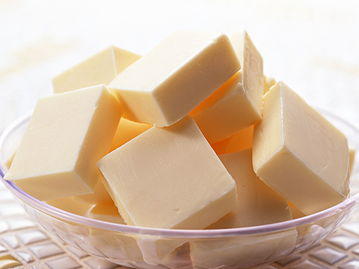A smooth curdled milk lump has soon been rolled.
一個光滑的“牛奶團子”很快就被揉了出來。
After several moves, the dough is dragged into a sheet which is then rolled up onto the bamboo rack by the wall.
三兩下后,奶團子被拉扯成片卷上墻邊的竹架。
In faraway Dali, Yunnan, a similar method is adopted by the Bai Minority to transform milk.
在遠離北方草原的云南大理白族人家用相似的手法來轉化這里的牛奶。
Rushan, made from milk, are hung and air-dried in the yard just like giant wind chimes.
乳扇被晾到場院里風干像是掛起了巨大的風鈴。
Over 800 years ago during the reign of Kublai Khan, the expeditionary Mongolians arrived and settled in Yunnan.
在800多年前,忽必烈時期的蒙古人遠征到云南定居至此的蒙古人。

They brought dairy products from their home.
也帶來了遙遠家鄉的奶食味道。
Unexpectedly, the way to transform milk has been passed down and still prospers even today.
他們不會想到,這種轉化的手法一直被流傳下來,生機勃勃。
Mother takes the hardened milk curd out of the wooden box.
媽媽從木盒里取出已經結實的奶豆腐。
Dried milk curd can be preserved for a long time.
風干的奶豆腐可以保存很久。
Meat is a luxury as livestock are too precious.
肉并不常吃,因為牲畜太寶貴了。
Dairy products have almost become the main food on the grassland.
各種奶食幾乎成為草原上的主食。
This is a Mongolian restaurant in downtown Beijing.
這是位于北京市區的一座大型的蒙古餐廳。
The mouth-watering roast lamb back is the top choice for diners here.
美味的的烤羊背成為食客們的首選。
It easily reminds us of the crude lifestyle on the grassland.
它很容易讓人聯想到遠方草原上那種粗獷的生活方式。
But to people living in the depth of the grassland, milk products are more close to their real life.
但是對于那些身處草原腹地的人們來說,這些奶食才更貼近他們原本的生活。
Rain brings temperatures down to freezing point.
雨讓氣溫降到了冰點。
Mengke's second elder sister has found a lost lamb in the bush.
二姐在灌木里發現了走失的羊羔。
Livestock are family assets and a part of a nomad's life.
這些牛羊是家庭的財產也是牧人生命的一部分。











